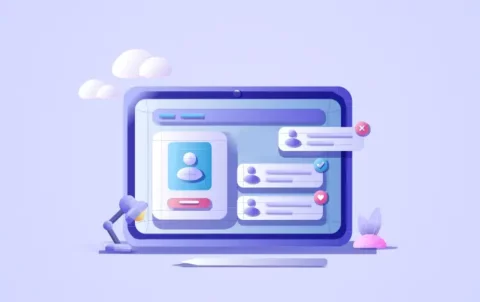© 2025 Next Level Business Services Inc. All Rights Reserved.
Jobs that AI will replace and future AI-proof jobs in 2025
By NLB Services
Artificial intelligence (AI) is rapidly transforming the job market, playing an ever-changing role with both potential disruption and exciting opportunities. As defined by , “Artificial Intelligence (AI) refers to the simulation of human intelligence in machines that are programmed to think and act like humans. AI works through new algorithms and computer programs that perform specific tasks such as visual perception, speech recognition, decision-making, and language translation.”
Leading professions that thrive in current times didn’t even exist just a few years ago. And this is true for the years to come as well. AI is now a prominent talk of the town, companies and organizations aren’t just investing in this emerging technology; they’re also looking at ways to leverage it to cut costs, save time, and step ahead of the competition. In this blog, we will explore what jobs will be replaced by AI, which will be safe, and how you can future-proof yourself in 2024.
Historical Perspective of AI Impacts on Jobs and Employment
Historical breakthroughs like the printing press, the steam engine, the internet, and each revolution changed society, and other economic purview and cultural beliefs. While it’s undeniable that some jobs became obsolete, it’s equally true that this shift paved the way for the creation of new and diverse job opportunities.
Though the AI technology is still in the infant stage. The impacts of previous innovations such as the power loom, steam engines, electricity, and digital computers make it evident what could happen next. The outcome of any technology depends on the leadership that makes pivotal decisions about how the technology develops. The same can be said for generative AI too.
Similarly, today’s AI developments could impact jobs in various industries which we will explore in the coming paragraphs.
The roots of AI go back to as early as the 1950s when the term was coined by Alan Turing (Often considered the father of modern computer science), After that, every decade a new breakthrough came into existence such as expert systems, Machine Learning and Deep Learning existence in the 90s, its phase-wise adoption in the 21st century, automation in the factories, robots taking up repetitive jobs and working 24 * 7, and in recent years AI brought language and image recognition capabilities which are close to those of humans and even better in some cases. AI has come a long way since then.
Jobs that AI will Likely Replace in 2024
AI is changing the way many people do their job and while it is true that AI will supplement the way many people do their job, it is also important to know which jobs will AI replace. Below we’ll look at the jobs that we believe AI could replace in the future if not sooner.
Customer Support/ Telemarketers
The first ones making to the list are customer support and telemarketers, right after the advent of generative AI tech like ChatGPT, companies are using AI chatbots and virtual assistants to handle first-level customer inquiries as well as telemarketers, this is going to cut down some level of workforce. As per Will Robots Take My Job, there is a 100% likelihood that these tasks will be automated. Also, you might have received robocalls on behalf of various services and companies, marking the start of these jobs getting replaced.
Courier and Transportation
Self-driving vehicles and drones are already transforming the courier job, and companies are investing heavily to work on autonomous vehicle driving, robots, and drone deliveries, this needs real-time data processing in huge quantities and with the introduction of AI and machine learning, the efficiencies of these models have increased. Jobs that involve driving or delivery tasks will eventually become redundant as more and more autonomous driving vehicles and drones are being deployed. The likelihood of the job of courier being replaced by AI is 95%.
Retail Salesman and Advertisers
Automated checkout systems, like self-checkout kiosks, and click and collect in grocery stores, have already reduced the need for cashiers and other retail positions. Similarly, as ads move towards the web and social media from print and television, the demand for these roles will cease to exist. People can make informed decisions through social media platforms and virtual ads. So the role of the salesman or advertiser is minimized and will eventually go away.
Market Analysts
Market research analysts are crucial in strategizing messaging, content, and products. However, automated AI with surveys can enhance data analysis capabilities and can compile the available information more efficiently. It may also reduce the demand for some lower-level data analysis jobs as automated tools become more sophisticated and do calculative decision-making.
Receptionists
With the set up of auto check-ins and entry systems in both large and small hotels and organizations, the need for receptionists, in the long run, is poised to diminish. Automated phone answering and scheduling systems can replace a lot of the traditional receptionist work. Nowadays, even in fast food joints, people can place orders through communication screens or tabs.
Bookkeeping Clerks
Bookkeeping and data entry are still professions for many. However, multiple tasks of bookkeeping are now getting automated. Automation can take it to a different level wearing the margin of error is minimal with more speed. It makes all the more sense to implement AI and ML in jobs of a repetitive nature. As per this website, these jobs are at high risk and an expected negative growth of 4.5% by 2032.
Proofreaders
Editing is considered a more complex job as it checks for tonality, comprehension, and others. On the other hand, proofreading is much simpler, it detects grammatical mistakes, sentence construction, and other errors that can easily be automated through different apps. For example, proofreading apps like Grammarly, and Microsoft Word have integrated AI tools for real-time proofreading and keeping other writing elements in check as you write.
Foot Soldiers
People on the battlefield are always at the risk of losing their lives or accidents. Deploying autonomous weapons systems and bots that can follow orders without constant supervision is a bright side of AI. Through AI these models can be trained on huge amounts of data to increase their accuracy and better decision making. Robots are now being used in military operations and even in hostile situations such as surveillance, intelligence, such as bomb defusing, and many more. A commentary from the head of the UK military also stated that “autonomous robots could soon form a quarter of the British army by 2030.”
Influencers
Another profession that may get replaced by AI is influencers, the creator economy is witnessing a shift towards AI influencers, for instance, Aitana López is an AI influencer with more than 243,000 followers on Instagram and earns up to $11,000 a month. Brands are finding it easy to collaborate with AI influences as it gives them flexibility and cost advantage.
Jobs that AI cannot replace in 2024
As an owner of the factory or a CEO, one can not ignore the perks of buying an expensive machine that can work 24/7 and without ever asking for a raise. More and more automated machines and software are coming out every day to take over any possible repetitive tasks that can be somewhat translated into a process that a computer or machine can understand.
But on the other side of the horizon, it’s important to note that some jobs that AI can not replace. Some jobs involve a humane touch that AI may not be able to fully recreate. While there are possibilities of involvement of AI tools, these are some of the jobs that are near-impossible to be replaced by AI soon.
Teachers and Professors
Learning is a vital part of our lives, we spend between 15 and 20 first years doing just that. It shapes so many different aspects of who we are. This is a key stage in one’s life and it can not be risked with AI. Teachers possess a crucial responsibility to share education, values, and life-long concepts of the subjects they specify.
Filmmakers
AI has become an important tool in the film industry. For example, they can help streamline pre-production processes and make special effects appear more realistic and immersive. However, filmmakers have something that Artificial can not replicate: the human factor Filmmakers, the ones who have absolute power over the artistic and dramatic aspects of films, have their jobs safe.
Singers
While AI can now be used to generate lyrics, musical instrument sounds, and even human voices, it can never match the capability of putting feelings and emotions as humans do. There is no denying that they may be able to help musical artists come up with new and better ideas, but AI music tools are not yet able to drive the passionate music that singers can impart to songs and the love that singers have for what they do.
Lawyers and Judges
Lawyers and judges are a strong part of the system. A lot of their knowledge is based on the personal experience and knowledge they specialize in. A certain set of skills is needed to understand and deal with complex legal systems and put your arguments in defense during court proceedings. And a human factor is involved when it comes down to considering all the various aspects of a trial and making a final decision that could turn into years in prison, in the case of a Judge.
Content Creators
Bloggers, vloggers, podcasters, social media influencers, and others fall under the category of content creators, while with the advent of generative AI, it appears that their job is in danger, but the truth is, that originality and authenticity are their weapons. They can create educational or entertaining materials for specific audiences to be expressed through a variety of mediums and channels, usually through digital media.
These content creators stand out from the rest through their unique and lovable personalities and values as well as having creativity, passion, editorial judgment, and empathy, these traits are hard to replicate by an AI.
Read More: Top 10 High-Paying AI Jobs in 2024
Athletes
While sports is having some rounds of AI too, the beauty of watching in awe these amazing performers improve upon their results over and over again, pushing the line further of what a human being is capable of physically achieving, is what makes the whole thing worth watching!
It’s true that robot-fights, and drone races have been popular for some time recently, But the beauty of an athlete or sportsman breaking their own record can just not be compared. Sure, robots and AI can also be deployed in some capacities of decision-making, but when it comes to pure sports, the age of AI and robots is far from perfect to be used in the capacity of some sports.
Computer System Analysts
Even if everything becomes automated, there will always be a need for human presence who can run maintenance work, update, improve, correct, and set up complex software and hardware systems that often require coordination among more than one specialist in order to get functions to work adequately.
All in all, the essence of this list is that AI can not replicate the human factor, what makes something unique, creative, and not monotonous is where AI fails and humans prevail. But the point that must be focused upon is that AI is a developing technology and new tools keep coming up that outperform each other.
So the sectors and professions that are less susceptible to AI are healthcare, creative, complex problem solving like civil engineering, research scientists, Human Resources and Management, and Education will majorly remain unaffected by AI.
How can you Future-Proof Career Against AI
So the question is, can you future-proof jobs against AI? If there is an AI tool that does exactly what you do, then you must worry and start working right away. Do not forget that you are a human and can adapt, learn, unlearn, and relearn things. Here are some strategies that can get you future-ready.
Be Creative
Even if your job is taken by AI, your creativity can never be replaced. AI tools can do fundamental tasks but it’s you who can bring something new to the table. AI works from a pool of data that already exists.
Master Management Skills
Soft skills like empathy, compassion, and communication can not be recreated by AI, it’s you who can have those skills and get your position cemented through mastering these skills.
Know how to operate and work with AI
AI is not necessarily your enemy. AI has enabled numerous new employment opportunities such as prompt engineering, LLM building, etc. Having an edge over AI is your way forward towards a future-proof career.
Embracing new technology and having a zeal for continuous learning, upskilling, and adaptability are the crucial skills that can help you master anything, and the time to start anything is now. AI is merely a tool where it just predicts the outcomes, text, and images with high accuracy. And there are high chances that the AI model’s predictability goes sideways, this is where your knowledge and skills are. It is the right tool when used in the right way. Hone the skill that you have and cultivate it, become an expert.
Conclusion: Navigating a Changing Job Landscape
In this blog, we looked at the jobs that AI will replace such as telemarketers, data entry, manufacturing and retailers, etc. Then we also looked at the sectors and jobs that are least vulnerable to AI and might supplement some roles. AI’s impact on employment is evident. But the way to navigate through the AI wave is to upskill. Amid the uncertain times where layoffs are making news now and then, getting AI-ready and embracing new technology will help you thrive and go beyond what you might be doing right now.
AI tech has the power to transform our professional lives anytime soon. By following the strategies shared in this blog, we hope that you can get the right guidance to identify and provide unique value through your skillset, The clearest path to career insurance for yourself to evolve, embrace, and adapt.
Talent Solutions








